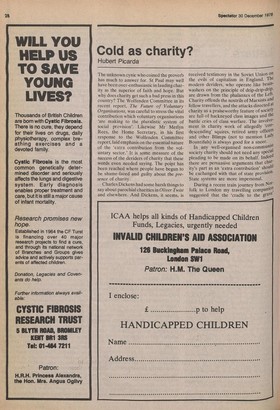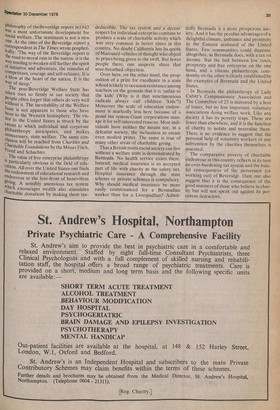Cold as charity?
Hubert Picarda
The unknown cynic who coined the proverb has much to answer for. St Paul may well have been over-enthusiastic in lauding charity as the superior of faith and hope. But why does charity get such a bad press in this country? The Wolfenden Committee in its recent report, The Future of Voluntary Organisations, was careful to stress the vital contribution which voluntary organisations 'are making to the pluralistic system of social provision'. Likewise Mr Merlyn Rees, the Home Secretary, in his first response to the Wolfenden Committee report, laid emphasis on the essential nature of the 'extra contribution from the voluntary sector.' It is some measure of the success of the deriders of charity that these words even needed saying. The poipt has been reached where people have begun to be shame-faced and guilty about the presence of charity.
Charles Dickens had some harsh things to say about parochial charities in Oliver Twist and elsewhere. And Dickens, it seems, is received testimony in the Soviet Union on the evils of capitalism in England. The modern deriders, who operate like brainwashers on the principle of drip-drip-drill, are drawn from the phalanxes of the Left: Charity offends the nostrils of Marxists and fellow travellers, and the attacks directed at charity as a praiseworthy feature of society are full of hackneyed class images and the battle cries of class warfare. The involvement in charity work of allegedly Val" descending' squires, retired army office,Irs and other Blimps (not to mention LanY Bountifuls) is always good for a sneer. In any well-organised non-communist society charity should not need any spec° pleading to be made on its behalf. Indeed there are persuasive arguments that charity's part as an 'extra contribution' should be exchanged with that of state provision. State systems are more impersonal.
During a recent train journey from N:0r. folk to London my travelling companl011, suggested that the 'cradle to the grave Philosophy of theBeveridge report ml 942 was a most unfortunate development for social welfare. The sentiment is not a new one. At the time of the Beveridge report a correspondent in The Times wrote prophetically: The way of the Beveridge report is the road to moral ruin in the nation: it is the way tending to weaken still further the spirit of initiative and adventure, the stimulus of Competition, courage and self-reliance. It is a blow at the heart of the nation. It is the way of sleep.' Tile post-Beveridge Welfare State has taken root so firmly in our society that People often forget that others do very well Without it. The inevitability of the Welfare State is not apparent to those who have been to the Western hemisphere. The visitor to the United States is struck by the extent to which individual and corporate Philanthropy anticipates, and makes unnecessary, state welfare. The same conclusion will be reached from Charities and Charitable Foundations by the Misses Fisch, reed and Schachter.
The value of free enterprise philanthropy is particularly obvious in the field of educ„ation. All over the United States one finds ule endowment of educational research and endeavour to the fore-front of benevolent giving. A sensibly unenvious tax system Which encourages wealth also stimulates charitable donations by making them tax deductible. The tax system and a decent respect for individual exterprise combine to produce a scale of charitable activity which was very common in better times in this country. No doubt California has its quota of Marcused vehicles of thought who object to prizes being given to the swift. But fewer people there, one suspects, share that sour-breathed objection.
Over here, on the other hand, the proposition of a prize for excellence in a state school is likely to occasion resistance among teachers on the grounds that it is 'unfair to the kids' (Why is it that sanctimonious radicals always call children `kids'?) Moreover the scale of education endowment is markedly less here because of a penal tax system.Giant corporations manage it for self-interested reasons. Most individuals have neither the means nor, in a defeatist society, the inclination to create even modest prizes. The same is true of many other areas of charitable giving.
That a British multi-racial society can live without a welfare state is demonstrated by Bermuda. No health service exists there. Instead, medical insurance is an accepted part of life with charity as the safety net. Hospital insurance through the state scheme or private schemes is compulsory. Why should medical insurance be more easily countenanced for a Bermudian worker than for a Liverpudlian? Admit redly Bermuda is a more prosperous society. And it has the peculiar advantages of a delightful climate, ambiance and proximity to the Eastern seaboard of the United States. Few communities could dispense altogether, as Bermuda does, with a tax on income. But the link between low taxes, prosperity and free enterprise on the one hand, and a vibrant philanthropic community on the other is clearly established by the examples of Bermuda and the United States.
In Bermuda the philanthropy of Lady Cubitt's Compassionate Association and The Committee of 25 is mirrored by a host of lesser, but no less important, voluntary associations doing welfare work. Like any society it has its poverty traps. These are fewer than elsewhere, and it is the function of charity to isolate and neutralise them. There is no evidence to suggest that the personal help of voluntary workers or any subvention by the charities themselves is resented.
The comparative poverty of charitable endeavour in this country reflects in its turn an over-burdening tax system and the baleful consequences of the perversion (or working out) of Beveridge. Dare one also suggest that it is the consequence of the good manners of those who believe in charity but will not speak out against its persistent detractors.























































 Previous page
Previous page